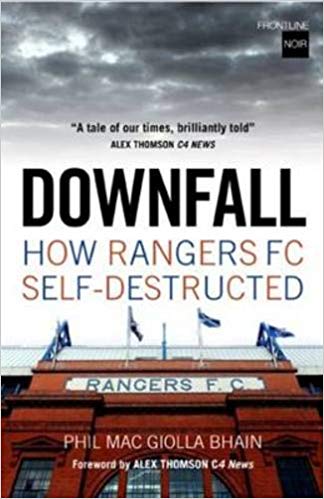Tangled up in Blue – Stephen O’Donnell on how Rangers lost track of their Foundation Date
BELOW is an exclusive edited extract from Tangled up in Blue; The Rise and Fall of Rangers FC’ by Stephen O’Donnell, which was published this week and is available on Amazon and at selected Waterstones Bookstores.
The Rangers supporters have predictably enough targeted this book and indeed the author as you probably have noticed if you are on Twitter. They have also been flooding Amazon to leave bottom ratings and abusive reviews for the new book. None of them will have read it of course. They are completely blinded to the truth.
They claim that Celtic fans are obsessed, many drop in random references to child abuse, but they importance of Stephen O’Donnell’s Tangled up in Blue is really to document the truth of what actually happened to Rangers FC in 2012 given the myths and lies that their support so readily believe.
In England we are witnessed the sad demise of Bury FC. Compare and contrast this situation with the liquidation of Rangers FC in 2012 after the failed CVA that summer. The truth is out there online – on the award winning Rangers Tax Case site for example – and was documented in 2012 by Phil Mac Giolla Bhain in his excellent Downfall book. But that remains the only proper account in print and it does not have the benefit of the perspective that O’Donnell has as a result of having had seven years for the dust to settle around the story of the fatal collapse of Rangers FC.

This first extract isn’t about the events of 2012 though, but deals with something you have probably thought was strange. When Rangers FC did go into liquidation the myth emerged that it was not the club but the holding company that ran the club that went bust.
That holding company running the club had never been mentioned, ever previously. It was obviously the best kept secret in Scottish football.
Here Stephen looks at the how Rangers actually lost track of their own foundation date, and it is a fairly remarkable tale…
Auldheid has reviewed Stephen’s new book on SFM.scot and you can read that HERE. Over to Stephen…
HOW RANGERS LOST TRACK OF THEIR OWN FOUNDATION DATE
Down the decades, Rangers fans and others associated with the club have generally paid little attention to the club’s history. The tradition of storytelling, of exploits recollected and hardships overcome, so common at other clubs, is not strong at Rangers, and the club has on the whole been poorly served by erstwhile historians.
The relatively small market for books on the subject has, at least until recently, offered readers little beyond the established pattern of inane hagiographies of former players and managers, and uncritical, self-congratulatory chronicles of the team’s achievements, usually written with the club’s approval, which reflect on little beyond Rangers’ seemingly unending association with sporting success.
Reading these books it is often difficult to get to the truth behind controversial issues and incidents involving the club, as rational analysis is sacrificed in favour of the more partisan perspective. There is also a predilection for the mundane and the jejune; when one writer, Robert McElroy, co-author of Rangers: The Complete Record was discussing his new book with a club director in the early 1990s the only significant question he was asked was: “How many photographs are going to be in it?”
This general level of disinterest in discovering and enjoying the past has meant that the early period has often been overlooked, resulting in some particularly curious anomalies.
By 1972, one hundred years had elapsed since the club’s foundation, but the centenary was allowed to pass without any acknowledgement or celebration, because the mistaken notion that the club was founded in 1873 had not been properly investigated and revealed. Victory in Barcelona in the Cup Winners’ Cup Final, achieved with a 3 – 2 win over Dynamo Moscow in May 1972, and arguably the high water mark of the club’s on-field achievements, would have been a fitting way to salute such a historical landmark, but unfortunately, somewhere along the way, Rangers lost track of the fact that they were founded in 1872, and they wrongly marked their centenary the following year, in 1973, a season in which the club had been banned from Europe due to the behaviour of their fans in the Nou Camp.

It might seem strange that a famous football club should be unable to accurately pinpoint the date of its foundation, but then Rangers are a club with a fairly dismal record of producing historically reflective books. One early example was The Story of the Rangers by sports journalist John Allan, published in 1923.
If traditional books about Rangers have offered little more than facile, obsequious eulogies, preaching to the already converted, then The Story of the Rangers is certainly no exception. Allan at the time was an influential columnist with the Daily Record, who would later go on to edit the paper, and he was a fervent supporter of the Ibrox club and its interests. He was described by manager Bill Struth as having ‘the clasp of a loyal Ranger’, an early reference, no doubt, to dodgy handshakes and secret societies.
Allan, the uncle of Willie Allison, the loathsome Ibrox PR guru of the 1960s whom Alex Ferguson described as ‘a religious bigot of the deepest dye’, was also editor of the official Rangers handbook, the annual chronicle of Rangers’ sporting record. For season 1920/1, the annual lists Rangers’ foundation date as 1872, but in the following year’s edition the date is omitted. It is also missing the season after that, but by 1924 the year of the club’s establishment is once again included, but listed as 1873.
Allan does not discuss any controversy surrounding the timing of the club’s foundation in The Story of the Rangers, and, had he been in any doubt, a minimal amount of basic journalistic research would have confirmed to him the correct date of 1872, which had been universally accepted up to that point. It seems that Allan, in his determination to publish his history of the club in time for its fiftieth jubilee, perpetrated an Orwellian rewriting of events and simply altered the year to suit his own purposes.
By 1923, Allan was simply in a rush and misused his position as editor of the club’s yearbook so that his deadline could be met. Incredibly, he altered the date just to give himself more time to write his book, and as a consequence of this historical vandalism, Rangers’ Cup Winners’ Cup victory in 1972 was allowed to pass without being properly celebrated as part of a centenary season success story.
As late as 1996, Allan’s date was still being used on club merchandise and retail outlets, and his gratuitous alteration is also the reason why visitors to Ibrox Park today can still see the year 1873 erroneously emblazoned on its listed building façade.
Stephen O’Donnell
Extract from Tanged up in Blue, by Stephen O’Donnell which is out now on Pitch Publishing and available at selected Waterstones stores and also on Amazon – you can order your copy HERE.
CLICK below to read our interview with ‘Tangled up in Blue author Stephen O’Donnell.





